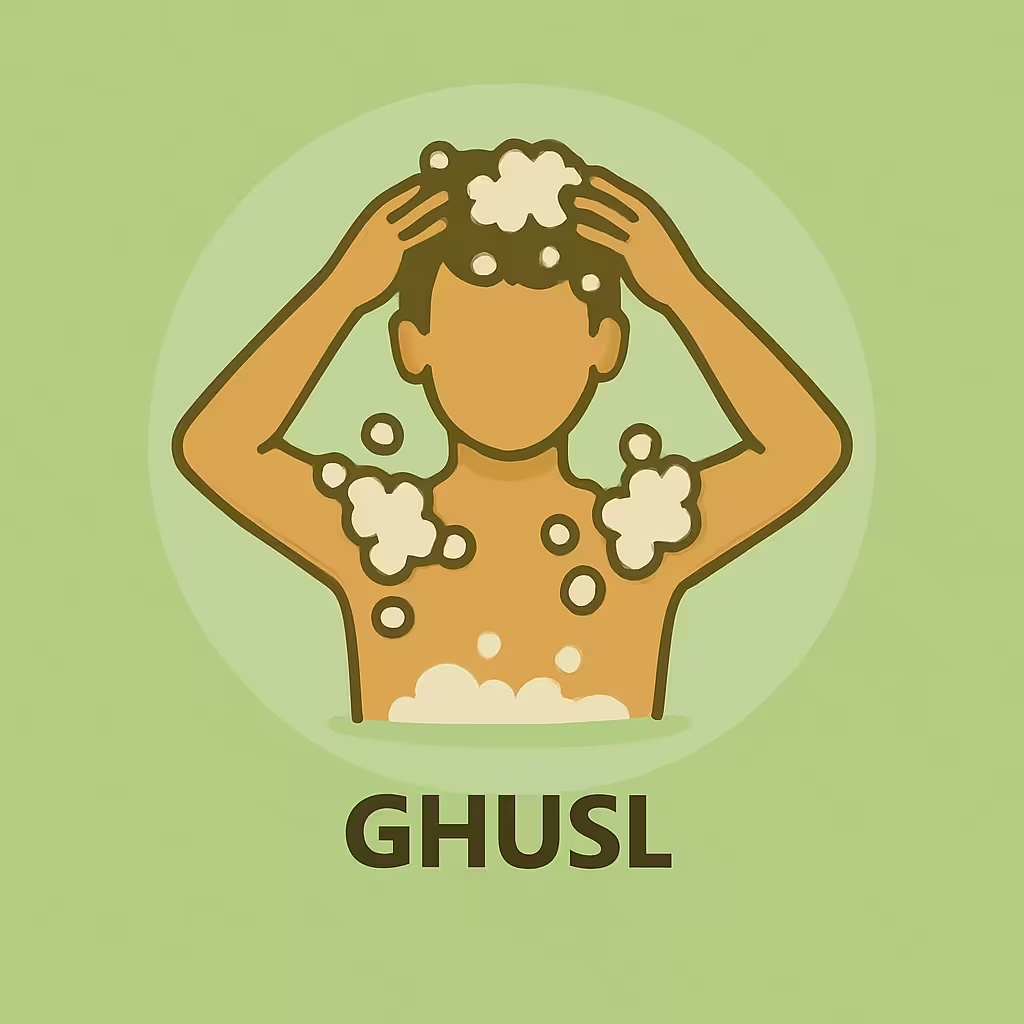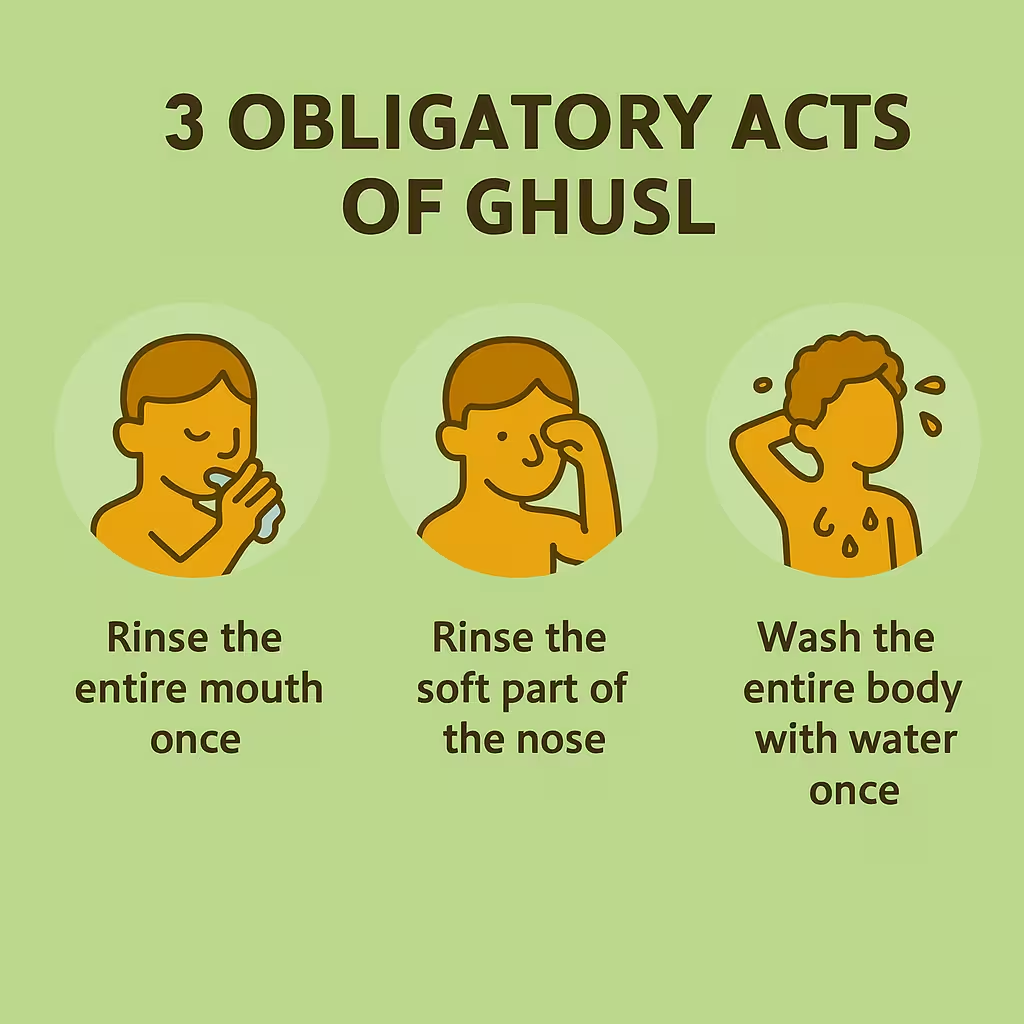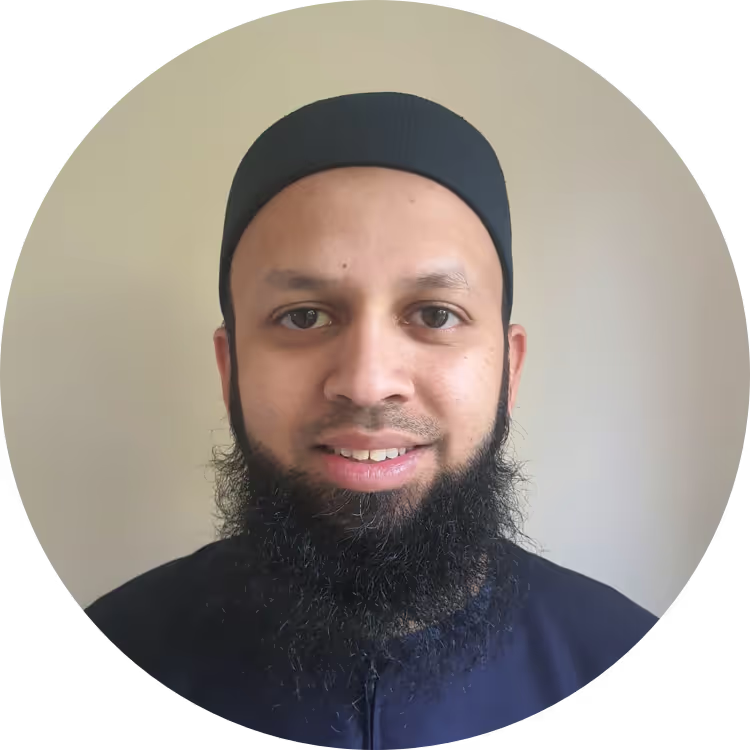Step‑by‑Step Guide to Ghusl (The Major Ritual Bath)
Ghusl is the major ritual bath. It takes you from a state of major ritual impurity back to a state of ritual purity. In this pure state you may pray and touch - or even recite - the Qur’an. Ghusl is also required for entering a mosque’s prayer hall and for ṭawāf in Mecca.
This guide covers when ghusl is obligatory, when it is sunnah, the minimum integrals (farḍ) that make it valid, and a step‑by‑step process with emphasised sunnahs.
When Is Ghusl Obligatory? (Hanafi)
These situations place a person in major ritual impurity; ghusl is then required to return to purity:
- Emission of sperm/sexual fluid (manī) after being aroused.
- Sexual intercourse with penetration, even if no fluid is emitted.
- Ending of menstruation or post‑natal bleeding.
- When an adult takes the shahādah and becomes Muslim, ghusl is performed afterwards.
Bottom line: In any of these cases, you must do ghusl to regain a state of purity.
When Is Ghusl Sunnah (Recommended)?
Ghusl is an emphasised sunnah in the following situations:
- Before the Friday (Jumu‘ah) Prayer.
- Before the two Eid prayers.
- When entering the state of ihram (pilgrim sanctity).
- On the Day of ‘Arafah for those performing Hajj.
The Minimum for a Valid Ghusl (Hanafi Integrals/Fard)
For ghusl to be valid, the Hanafi school requires three integrals:
1) Rinse the entire mouth once
Ensure water reaches throughout the mouth.
2) Rinse the soft part of the nose
Cup some water in your hand, bring it to your nose, inhale gently so a little water enters, then blow your nose.
3) Wash the entire body with water once
Wash whatever is possible (without undue difficulty) from the top of the head to the tips of the toes. Make sure water reaches:
- Skin beneath the beard, moustache, and eyebrows.
- The outer ear and opening of the ear canal.
- Inside the belly button.
- All hair, including the roots.
- For women with braided hair, washing the roots alone is sufficient.
- The external orifice of the genitals and, for women, the underskin of the clitoral hood.
How to Perform Ghusl Step‑by‑Step (With the Emphasised Sunnahs)
The following method includes emphasised sunnahs that complete the etiquette of ghusl and maximise reward. It also ensures the three integrals above are fulfilled.
Step 1 — Start with intention (niyyah) and the basmalah (bismillah)
- It is encouraged to begin all good acts with the name of Allah: Bismillāh ar‑Raḥmān ar‑Raḥīm (In the name of God, the Merciful, the Compassionate).
- Say this before removing your clothes.
- Intend specifically to perform ghusl to become ritually pure, not just to take a normal shower or bath.
Maximise your reward: Intention is what transforms a merely valid act into an act that pleases Allah and brings reward.
This is not however an obligatory step.
Step 2 — Wash your hands and wrists
This opens the ghusl with cleanliness and prepares you for the rest of the wash.
Step 3 — Wash the private parts
Remove any impurity from the area.
Step 4 — Remove any dirt or substances on the body
Ensure there is nothing blocking water from reaching the skin.
Step 5 — Perform a complete wuḍū’ (ablution)
Carry out a full ablution as you would for prayer.
Step 6 — Wash your entire body three times (3x)
- Cover the whole body with water three times.
- Recommended: Wash the right side first, then the left.
- Shower tip: If using a shower, it is sufficient to remain under it long enough that water completely covers your body. In a modern shower, about 60 seconds normally satisfies this coverage.
Remember: While these sunnah steps complete the etiquette, your ghusl’s validity rests on doing the three integrals: rinsing the mouth, rinsing the nose, and washing the entire body so water reaches everywhere required.
FAQs on How to Perform Ghusl (Hanafi)
Do women with braids need to undo them for ghusl?
No. In the Hanafi madhhab, water reaching the roots is sufficient for a valid ghusl when hair is braided.
Is saying “Bismillāh” part of the ghusl?
It is encouraged to begin all good acts with the name of Allah. For ghusl, say it before removing your clothes and make a specific intention for ritual purity.
When must I perform ghusl after becoming Muslim?
When an adult takes the shahādah and becomes Muslim, ghusl is performed afterwards.
Summary: The Easiest Way to Perform Ghusl (Hanafi)
- Intend ghusl for purity and say Bismillāh before undressing.
- Hands & wrists → private parts → remove any dirt.
- Complete wuḍū’.
- Rinse mouth and nose, and wash the entire body—making sure water reaches everywhere (beard/eyebrows, ear openings, belly button, all hair including roots, the external genital orifice, and for women, the underskin of the clitoral hood).
- Wash the whole body three times, right side first recommended; a modern shower for ~60 seconds typically achieves full coverage.
By following these steps, you’ll fulfil the integrals that make ghusl valid and embrace the emphasised sunnahs that beautify the act and increase your reward.


















.avif)

Lorem ipsum dolor sit amet, consectetur adipiscing elit. Suspendisse varius enim in eros elementum tristique. Duis cursus, mi quis viverra ornare, eros dolor interdum nulla, ut commodo diam libero vitae erat. Aenean faucibus nibh et justo cursus id rutrum lorem imperdiet. Nunc ut sem vitae risus tristique posuere.
Lorem ipsum dolor sit amet, consectetur adipiscing elit. Suspendisse varius enim in eros elementum tristique. Duis cursus, mi quis viverra ornare, eros dolor interdum nulla, ut commodo diam libero vitae erat. Aenean faucibus nibh et justo cursus id rutrum lorem imperdiet. Nunc ut sem vitae risus tristique posuere.